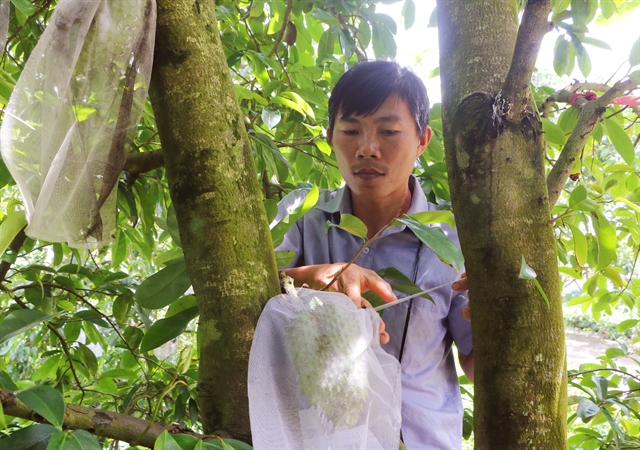 Society
Society

 |
| Caption: An orchard belonging to the Kiên Hoà Soursop Co-operative that is planted to organic standards in Ngã Năm Town’s Vĩnh Qưới Commune in Sóc Trăng Province. – VNA/VNS Photo Tuấn Phi |
SÓC TRĂNG —Sóc Trăng Province has adopted organic and high-quality farming methods to increase efficiency and develop agriculture sustainably.
In just 2022-23, the Cửu Long (Mekong) Delta province has organised hundreds of training courses in organic agriculture for officials, members of co-operatives and co-operative groups, companies, and households participating in its organic agriculture development plan.
It has also organised two field trips for participants to study organic farming models in Lâm Đồng, Vĩnh Long and Bến Tre provinces.
It has taught them how to run organic farming models, evaluated and certified them, promoted organic products, and developed linkages between various stakeholders to ensure the sale of organic products.
Under the plan, 46 organic farming models for fruits, beef, goats, sheep, aquatic species, and rice fish were developed in 2022-23.
Last year, the plan subsidised by 50 per cent the costs of organic fertilisers, bioproducts and rice seeds for 28 farming models.
It has helped change the mindsets of participating farmers about organic agriculture, create jobs and improve their incomes.
It has organised trade promotions for organic products at seminars and forums held in Sóc Trăng and elsewhere.
Trần Trọng Khiêm, deputy director of the province Department of Agriculture and Rural Development, said the plan aims to instil knowledge in all participating farmers about the domestic and international criteria for organic agriculture and the production of organic products.
It seeks to have 210ha under organic crops with local or international organic certification, increase its output to 1.2 – 1.6 times that of non-organic crops and ensure 100 per cent sales.
Vương Quốc Nam, deputy chairman of the province People’s Committee, has instructed the agriculture department, other related agencies, and local authorities to implement the plan better.
He said localities should increase advocacy activities to ensure households participate effectively in the plan and companies that supply organic fertilisers and bioproducts secure the quality of organic agricultural, forestry, and seafood products.
He said co-operatives, co-operative groups, and households should scrupulously follow organic farming processes to ensure their products meet market requirements, especially for exports.
High-quality products
Many farmers and co-operatives in Sóc Trăng have adopted high-quality or organic farming methods to improve quality and profits.
Trinh Phú Agriculture Co-operative in Kế Sách District’s Trinh Phú Commune farms 32ha of purple milk apples to Vietnamese good agricultural practices (VietGAP) and organic standards.
It produces around 480 tonnes of fruit a year and has been granted a production code for exporting to the US.
Hồ Văn Hội, its director, said: “After the co-operative’s purple milk apples were exported to the US for two years, they were recognised as a four-star product under the country’s ‘One Commune-One Product’ (OCOP) programme in 2020.”
The fruits enjoyed a premium of 20 - 50 per cent when his co-operative signed contracts to sell them to export companies, he said.
When they are sold domestically, traders buy it at VNĐ2,000 - 5.000 per fruit higher than the market price, helping the co-operative’s members increase their incomes, he said.
Farmers earn profits of VNĐ400 million (US$15,900) per hectare of purple milk apple per year, he added.
With its favourable natural conditions, Kế Sách District grows many speciality fruits such as green skin and pink flesh grapefruit, 5 roi grapefruit, mangosteen, durian, jackfruit, and milk apple.
Its purple milk apple became, in 2018, the province’s first fruit to be exported to the US.
In Ngã Năm Town’s Vĩnh Qưới Commune, hundreds of households grow soursop, which can tolerate alum-affected soil and saltwater.
Many farmers grow the fruit to organic standards and earn high profits.
Kiên Hoà Soursop Co-operative in Vĩnh Qưới Commune is growing 30ha of soursop to organic standards with guaranteed purchases by HCM City-based companies.
Lê Bảo Xuyên, its director, said the average soursop output is 700 tonnes a year, and members get VNĐ 2,000 per kilogramme higher than the market price, which helps them earn profits of VNĐ500 million ($19,800) per hectare annually.
The co-operative uses 20 per cent of the output to make products such as tea, jam and wine, he said.
It has two products (Ngọc Trân soursop tea and Ngọc Trân soursop jam) with three stars under the OCOP programme, with the tea also recognised as one of the province’s typical agricultural and rural products, he added. – VNS




